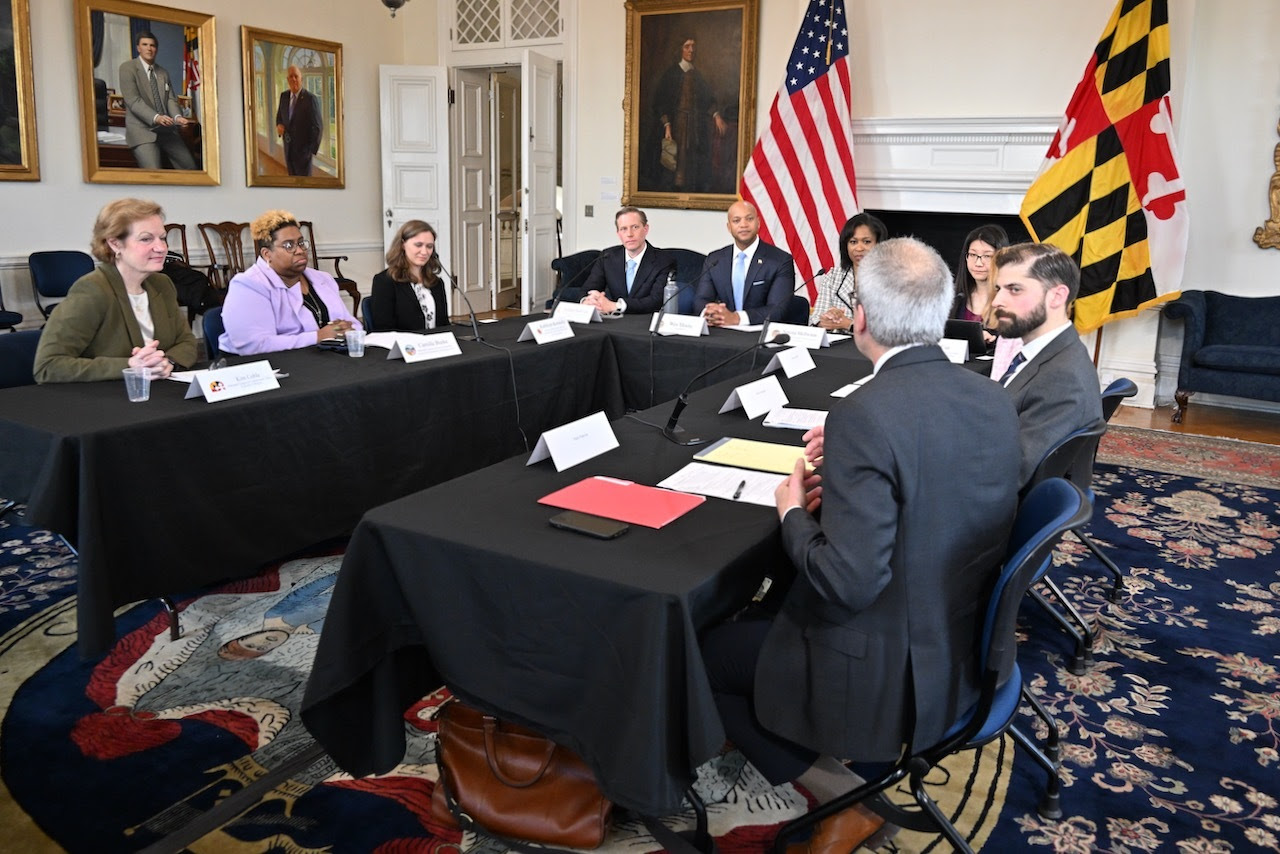Governor Moore Announces New Partnership Between Maryland Department of Environment and University of Maryland Center for Global Sustainability to Model Maryland’s Climate Goals Pathway
4/3/2023
ANNAPOLIS, MD — Governor Wes Moore today announced a new partnership between the Maryland Department of the Environment and The Center for Global Sustainability at the University of Maryland to model Maryland’s pathway toward ambitious climate goals. The announcement came during a roundtable discussion at the State House with climate goal stakeholders including representatives from the Maryland Department of the Environment, University of Maryland, League of Conservation Voters, Maryland Commission on Environmental Justice and Sustainable Communities, and Blink Charging.
“We face an historic challenge – and we will tackle it with an all-of-government, an all-of-community, and an all-of-state approach,” said Governor Moore. “We cannot win this fight alone. It will take partnership, it will take collaboration, it will take teamwork; that includes this partnership with the University of Maryland and all of the stakeholders today.”

Maryland’s Climate Solutions Now Act of 2022 calls for 60% in emissions reductions by 2031—the most ambitious target in the country. The act requires the state to reduce greenhouse gas emissions by setting more aggressive state goals; requires electric companies to increase gross energy savings; develops energy efficiency and emissions reduction requirements for certain buildings; establishes zero-emission vehicle requirements in the state fleet; and establishes an electric school bus pilot program.
The act also set Maryland’s first-ever net-zero emissions goal. By 2045, annual statewide greenhouse gas emissions must be balanced with removals of greenhouse gasses from the atmosphere, such as from carbon sequestration in trees and soils.
“These ambitious plans must not only include solutions to achieve our goals but must also lay a foundation for just and equitable implementation,” said Maryland Department of the Environment Secretary Serena McIlwain. “Marylanders’ voices are critical in helping the plan deliver emissions reductions and realize economic benefits across the state.”
The analysis and framework will outline the emissions reductions potential from multiple sectors and cover all harmful greenhouse gas emissions—including methane and hydrofluorocarbons. Critically, the framework will set the stage for actors at all levels to engage in thoughtful climate leadership to improve Maryland’s air and environment and help transition the most vulnerable communities to clean energy.
“Our experts will work directly with our state partners and other stakeholders to understand the current climate trajectory based on state and local policies, federal action, and market forces,” said Director of the Center for Global Sustainability Nate Hultman. “Our analysis will identify new and feasible state policies to help reduce the necessary emissions while improving economic, public, and environmental health for all.”
The Maryland Department of the Environment is currently seeking public input on climate change strategies for Maryland. The report and framework will then be open for public comment this summer. Following the open comment period, a final policy framework and plan will be delivered at the end of 2023.
4/3/2023
ANNAPOLIS, MD — Governor Wes Moore today announced a new partnership between the Maryland Department of the Environment and The Center for Global Sustainability at the University of Maryland to model Maryland’s pathway toward ambitious climate goals. The announcement came during a roundtable discussion at the State House with climate goal stakeholders including representatives from the Maryland Department of the Environment, University of Maryland, League of Conservation Voters, Maryland Commission on Environmental Justice and Sustainable Communities, and Blink Charging.
“We face an historic challenge – and we will tackle it with an all-of-government, an all-of-community, and an all-of-state approach,” said Governor Moore. “We cannot win this fight alone. It will take partnership, it will take collaboration, it will take teamwork; that includes this partnership with the University of Maryland and all of the stakeholders today.”

Maryland’s Climate Solutions Now Act of 2022 calls for 60% in emissions reductions by 2031—the most ambitious target in the country. The act requires the state to reduce greenhouse gas emissions by setting more aggressive state goals; requires electric companies to increase gross energy savings; develops energy efficiency and emissions reduction requirements for certain buildings; establishes zero-emission vehicle requirements in the state fleet; and establishes an electric school bus pilot program.
The act also set Maryland’s first-ever net-zero emissions goal. By 2045, annual statewide greenhouse gas emissions must be balanced with removals of greenhouse gasses from the atmosphere, such as from carbon sequestration in trees and soils.
“These ambitious plans must not only include solutions to achieve our goals but must also lay a foundation for just and equitable implementation,” said Maryland Department of the Environment Secretary Serena McIlwain. “Marylanders’ voices are critical in helping the plan deliver emissions reductions and realize economic benefits across the state.”
The analysis and framework will outline the emissions reductions potential from multiple sectors and cover all harmful greenhouse gas emissions—including methane and hydrofluorocarbons. Critically, the framework will set the stage for actors at all levels to engage in thoughtful climate leadership to improve Maryland’s air and environment and help transition the most vulnerable communities to clean energy.
“Our experts will work directly with our state partners and other stakeholders to understand the current climate trajectory based on state and local policies, federal action, and market forces,” said Director of the Center for Global Sustainability Nate Hultman. “Our analysis will identify new and feasible state policies to help reduce the necessary emissions while improving economic, public, and environmental health for all.”
The Maryland Department of the Environment is currently seeking public input on climate change strategies for Maryland. The report and framework will then be open for public comment this summer. Following the open comment period, a final policy framework and plan will be delivered at the end of 2023.
